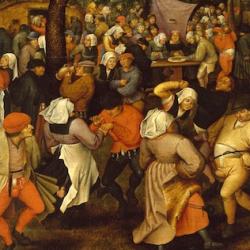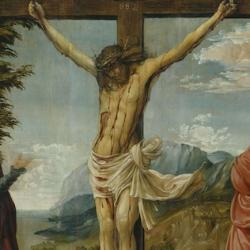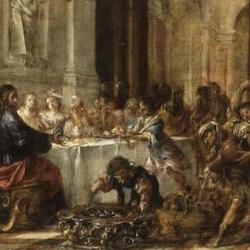In an article on temple Christology in John , Mark S. Kinzer devotes a few illuminating pages to Jesus’ discussion with Nicodemus. Citing Raymond Brown, he points out that the dialog is set in the middle of a chiasm that includes extensive treatment of Jesus as the temple:
A. First sign at Cana (2:1-12)
B. Cleansing of the Temple in Jerusalem (2:13-25)
C. Discourse with Nicodemus; the Baptist?s Final Witness (3:1-36)
B’1. Discourse with the Samaritan Woman at Jacob’s Well (4:1-45; cf. esp. vv. 20-24)
A’. Second Sign at Cana (4:46-54)
Kinzer notes that for first-century Jews, the temple linked heaven and earth, and points to Jesus’ reference to Jacob at Bethel/”House of God” (1:51) to show that Jesus presents Himself as this templar ladder, on which heavenly liturgists ascend and descend.
In Jesus’ dialog with Nicodemus, these images return:
Jesus speaks of birth from above, tells Nicodemus that He alone can ascend to heaven because He alone descended as “Son of Man,” the same Son of Man on whom angels ascend and descend (3:13). Jesus thus claims to be uniquely able to “journey through the halls of the heavenly Temple” when He is “lifted up” on the cross and in His resurrection and ascension. Jesus ascends to the glory He had from the beginning (3:13; 17:5).
Kinzer links this to Rabbinic beliefs about the Shekinah’s descent and ascent. According to Genesis Rabbah and other sources, “the Shekhinah first descends to dwell in the Garden of Eden, but then is driven back to heaven by human sin. It returns again to dwell in the Tabernacle and Temple, only to be driven away once again by Israel’s sin.” He sees a similar dynamic working out in the gospel story: Jesus descended, as He says, from heaven as the glory, He is rejected by the Jews because of His zeal for His Father’s house (2:16-21), leaving behind a desolated Jerusalem temple (cf. 11:47-53). He returns to the heavenly temple, but this withdrawal is the basis for another descent, this time of the Spirit, “which will bring the first descent to fruition.”
In this context, the kingdom of God that Nicodemus cannot see or enter is the heavenly temple. To join Jesus in His ascent, to be part of the heavenly liturgy, or to be part of the assembly gathered in the presence of the new Shekinah of the Spirit, Nicodemus must be purified by water and Spirit. Being born from above means being born into purity that allows participation in heavenly liturgy above. As Kinzer says, “John sees the gift of the Spirit as that which brings true purification and allows one to worship in the true Temple.” One of the curiosities here is that birth by water and Spirit, unlike birth under the law, purifies rather than defiles: What is born of flesh is flesh, and flesh cannot participate in the heavenly liturgy; for that one has to become spirit by being born of Spirit.











